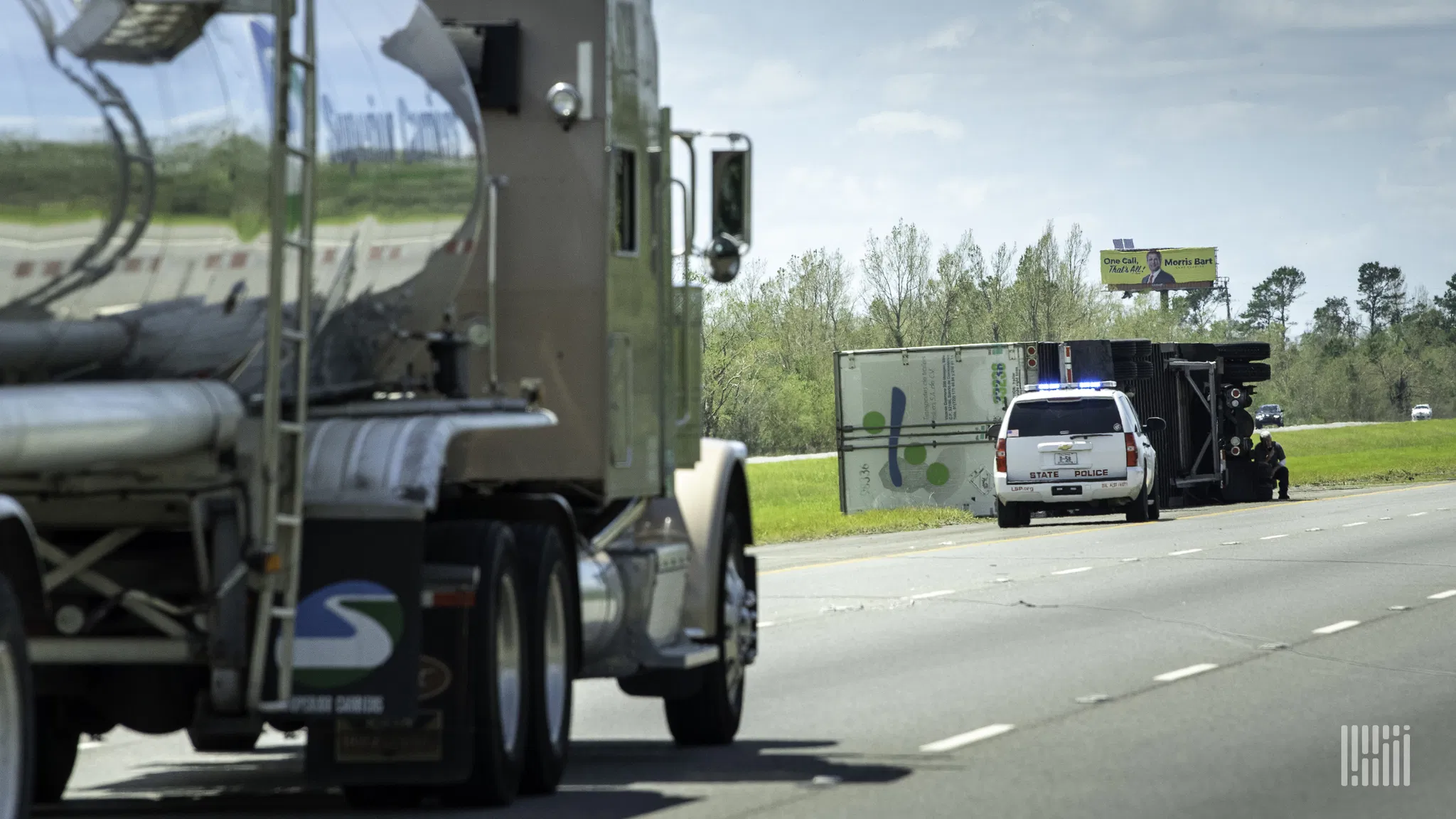A teherautó-sofőrök képesítéseivel kapcsolatos aggályok megértése
A hamis kereskedelmi jogosítványok (CDL-ek) elterjedése jelentős vitát váltott ki a teherautó-sofőrök képesítéséről az Egyesült Államokban. Az olyan államokban, mint Arkansas és Texas, a közelmúltbeli törvényhozási intézkedések rávilágítanak arra, hogy sürgősen foglalkozni kell ezzel a kérdéssel a közúti biztonság növelése és a magasabb színvonal fenntartása érdekében a tehergépjármű-iparban.
Ez a cikk megnyitja az ajtót egy összetett narratíva előtt, amely magában foglalja az állami és szövetségi szabályozásokat, a csalást, és az ebből eredő következményeket a logisztika számára. Ez egy olyan téma, amely nemcsak az iparágban dolgozókkal rezonál, hanem tükrözi a számonkérhető gyakorlatok fontosságát a biztonságos és megbízható szállítás biztosítása szempontjából is.
Új törvényhozási megközelítés Arkansasban
A közelmúltban Arkansas bevezetett egy kritikus jogszabályt, a 1745. sz. törvénytervezetet, amelynek célja a hamis CDL-ek problémájának közvetlen kezelése. Ez a törvény D. osztályú bűncselekményként kezeli a hamis CDL bemutatását vagy a megfelelő dokumentáció nélküli haszongépjármű üzemeltetését. Ez a határozott lépés a sofőrök minőségének szélesebb körű kezelésére irányuló intézkedések része az államban.
Az Arkansas-i Kamionszövetség, Shannon Newton elnök vezetésével, kulcsszerepet játszott ebben a kezdeményezésben. A törvény rögzíti, hogy bizonyos CDL-engedéllyel rendelkezőknek amerikai munkavállalási engedéllyel kell rendelkezniük a kereskedelmi tevékenységhez. A be nem tartásért járó büntetések fokozatosan emelkednek, az első szabálysértésért 500 dolláros bírsággal kezdődnek, és a későbbi szabálysértésekért 1000 dollárra emelkednek, ami megerősíti az állam elkötelezettségét a sürgető probléma kezelése iránt.
Törvényhozási motiváció és háttér
Az államok közötti erőfeszítések összehangolása nyilvánvalóvá vált, amikor Newtont a texasi megfelelője megkereste a hamis CDL-ek elterjedtségével kapcsolatban. A Texas Trucking Association már kezdeményezett intézkedéseket a probléma kezelésére, miután jelentős számú hamis Licencias Federal de Conductor (LFC) dokumentumot tárt fel a közúti ellenőrzések során.
A felfedezés a hamis dokumentumok feketepiacára mutatott, amelyet olyan vezetők használtak, akik esetleg nem rendelkeznek megfelelő képesítéssel. Ez a leleplezés katalizátorként szolgált Arkansas számára, hogy hasonló intézkedéseket fogadjon el, és kezelje a hamis személyazonosító okmányok által jelentett fenyegetéseket.
A texasi törvénykezés hatása
Texasban a végrehajtó tisztviselők olyan megoldásokat kezdtek alkalmazni, amelyek további azonosító okmányokat igényelnek, például munkavállalási engedélyt vagy zöldkártyát. Ennek a törekvésnek az volt a célja, hogy megszüntesse azokat a kiskapukat, amelyeket a rosszindulatú szereplők csalárd módon kihasználnak. Azonban az egyik előre nem látható hatás az volt, hogy megnőtt azoknak az egyéneknek a száma, akik nem mutattak be hamis jogosítványt az út menti ellenőrzéseken, mivel inkább azt állították, hogy nincs jogosítványuk, így elkerülve a súlyosabb büntetéseket.
Ez fontos kérdéseket vet fel az állami szabályozások összekapcsolódásával kapcsolatban, és azzal kapcsolatban, hogy egy államban a szigorúbb ellenőrzés hogyan tolhatja el a problémát máshová. Ahogy a végrehajtás megszilárdul Texasban, akaratlanul áthelyezi a kockázatokat a szomszédos államokba, mint például Arkansas és Louisiana, ezzel egy olyan dominóhatást generálva, amely egységes fellépést igényel a szabályozási gyakorlatokban.
A szabályozói felügyelet szerepe
A szabályozási környezet egy komplex labirintus, amely helyi, állami és szövetségi irányelveket foglal magában. A törvények és kiskapuk kavalkádja, kiegészítve a teherautó-ipar nemzetközi dinamikájával, olyan környezetet teremt, amely alkalmas arra, hogy a szükséges képesítéseket megkerülni akaró egyének kihasználják.
Folyamatosan zajlik a vita a nyelvi követelményekről és arról, hogy ezek hogyan kapcsolódnak a járművezetői képesítések jogszerűségéhez. Egyes érdekelt felek a szigorúbb, kizárólag angol nyelvtudáson alapuló szabályozást támogatják, míg mások aggodalmukat fejezik ki a potenciális diszkrimináció miatt. Fontos, hogy a logisztikai vállalatok és a szabályozó testületek egyensúlyt találjanak, amely biztosítja a magas színvonalat anélkül, hogy elidegenítené a képzett járművezetőket.
A logisztikára vonatkozó jövőbeli következmények
A CDL-csalás következményei túlmutatnak az egyes államokon; az egész logisztikai és szállítási ökoszisztémában visszhangoznak. A képzetlen vezetők beáramlása a közutakon a balesetek számának növekedéséhez vezethet, ami a károkhoz és a felelősséghez kapcsolódó költségeket is növeli. Emellett a járművezetői dokumentáció fokozott ellenőrzése lelassíthatja a logisztikai folyamatot, ami befolyásolja a rakományszállítmányokat és az időben történő kiszállításokat.
Ahogy az államok szigorúbb törvényeket vezetnek be, a logisztikai vállalatoknak hozzá kell igazítaniuk gyakorlataikat, biztosítva, hogy a sofőrök ne csak képzettek legyenek, hanem megfeleljenek az összes helyi előírásnak is. Ez megkövetelheti a vállalatoktól, hogy alapos átvilágításba, képzési programokba, és potenciálisan akár a szabályozó szervekkel való partnerségekbe is fektessenek be a biztonságosabb közlekedés előmozdítása érdekében.
Következtetés
Ahogy ez a gyorsan változó helyzet kibontakozik Arkansasban és Texasban, aláhúzza a CDL-csalások kezelésének fontosságát és a szabályozói egységesség szükségességét. A járművezetők képesítéseinek integritásának biztosítása prioritássá kell válnia a közbiztonság védelme és a megbízható logisztikai gyakorlatok elősegítése érdekében.
A GetTransport.com készen áll a logisztikai igények támogatására, megbízható megoldásokat kínálva az áruk globális szállítására. A megfizethető áruszállítási lehetőségekkel és az átláthatóságra összpontosítva a felhasználók hatékonyan és eredményesen biztosíthatják szállítmányaikat. A mai felgyorsult környezetben a legmagasabb szállítási színvonal fenntartása nem csupán előnyös, hanem elengedhetetlen.
A CDL-csalások kezelése kulcsfontosságú a biztonságos logisztikai mûveletek biztosításához. Még a legjobb információk sem vetekedhetnek a személyes tapasztalattal, és ahogy ebben a környezetben navigál, gondolja át, hogyan biztosíthatja a GetTransport.com az Ön számára szükséges könnyedséget és kényelmet. Biztosítson hatékony, költséghatékony megoldást a rakományához még ma. Következõ rakományszállításához fontolja meg a GetTransport.com megbízhatóságát – ahol az átláthatóság találkozik a megfizethetõséggel. Foglaljon most a következõ címen: GetTransport.com.com.

 A CDL-csalások és a szabályozási kihívások kezelése a közúti biztonság biztosítása érdekében">
A CDL-csalások és a szabályozási kihívások kezelése a közúti biztonság biztosítása érdekében">